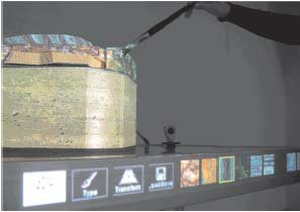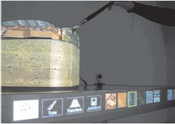Information
- Publication Type: Conference Paper
- Workgroup(s)/Project(s): not specified
- Date: 2005
- ISBN: 0-7803-8929-8
- Location: Bonn, Germany
- Lecturer: Kresimir Matkovic
- Editor: B. Frohlich, S. Julier, and H. Takemura
- Booktitle: Proceeding of IEEE Virtual Reality 2005
- Conference date: 12. March 2005 – 16. March 2005
- Pages: 245 – 248
Abstract
The ability to physically change properties of real objects used in augmented reality (AR) applications is limited. Geometrical properties (shape, size) and appearance (color, texture) of a real object remain unchanged during a single application run. However, an AR system can be used to provide a virtual texture for the real object. The texture can be changed dynamically based on user interactions. The developed AR system includes two components, the 3D Table and the Texture Painter. The 3D Table is a table where real objects are placed. The tabletop is used as a projection surface, making it possible to add a context to the real object. The Texture Painter makes it possible to paint on the real object, using a real brush and virtual ink (texture). ARToolkit markers are placed on the 3D Table tabletop to augment the environment with the virtual objects. Markers are either physical (printouts on the tabletop) or virtual (projections). The scene is recorded with a camera and the composed video is projected in real time. The projection shows a virtual environment, real objects painted with virtual ink, and virtual objects positioned where real or virtual ARToolkit markers are placed. The developed system is used in architectural design applications where, due to the different qualities of real architectural models and rendered architectural models, real models are still used. The system was tested at the Academy of Fine Arts in Vienna where it is used as a support tool for architecture students.Additional Files and Images
Weblinks
No further information available.BibTeX
@inproceedings{matkovic-2005-dyn,
title = "Dynamic Texturing of Real Objects in an Augmented Reality
System",
author = "Kresimir Matkovic and Thomas Psik and Ina Wagner and Denis
Gracanin",
year = "2005",
abstract = "The ability to physically change properties of real objects
used in augmented reality (AR) applications is limited.
Geometrical properties (shape, size) and appearance (color,
texture) of a real object remain unchanged during a single
application run. However, an AR system can be used to
provide a virtual texture for the real object. The texture
can be changed dynamically based on user interactions. The
developed AR system includes two components, the 3D
Table and the Texture Painter. The 3D Table is a table
where real objects are placed. The tabletop is used as a
projection surface, making it possible to add a context to
the real object. The Texture Painter makes it possible to
paint on the real object, using a real brush and virtual ink
(texture). ARToolkit markers are placed on the 3D Table
tabletop to augment the environment with the virtual
objects. Markers are either physical (printouts on the
tabletop) or virtual (projections). The scene is recorded
with a camera and the composed video is projected in real
time. The projection shows a virtual environment, real
objects painted with virtual ink, and virtual objects
positioned where real or virtual ARToolkit markers are
placed. The developed system is used in architectural design
applications where, due to the different qualities of real
architectural models and rendered architectural models, real
models are still used. The system was tested at the Academy
of Fine Arts in Vienna where it is used as a support tool
for architecture students.",
isbn = "0-7803-8929-8 ",
location = "Bonn, Germany",
editor = "B. Frohlich, S. Julier, and H. Takemura",
booktitle = "Proceeding of IEEE Virtual Reality 2005",
pages = "245--248",
URL = "https://www.cg.tuwien.ac.at/research/publications/2005/matkovic-2005-dyn/",
}


 PDF
PDF
